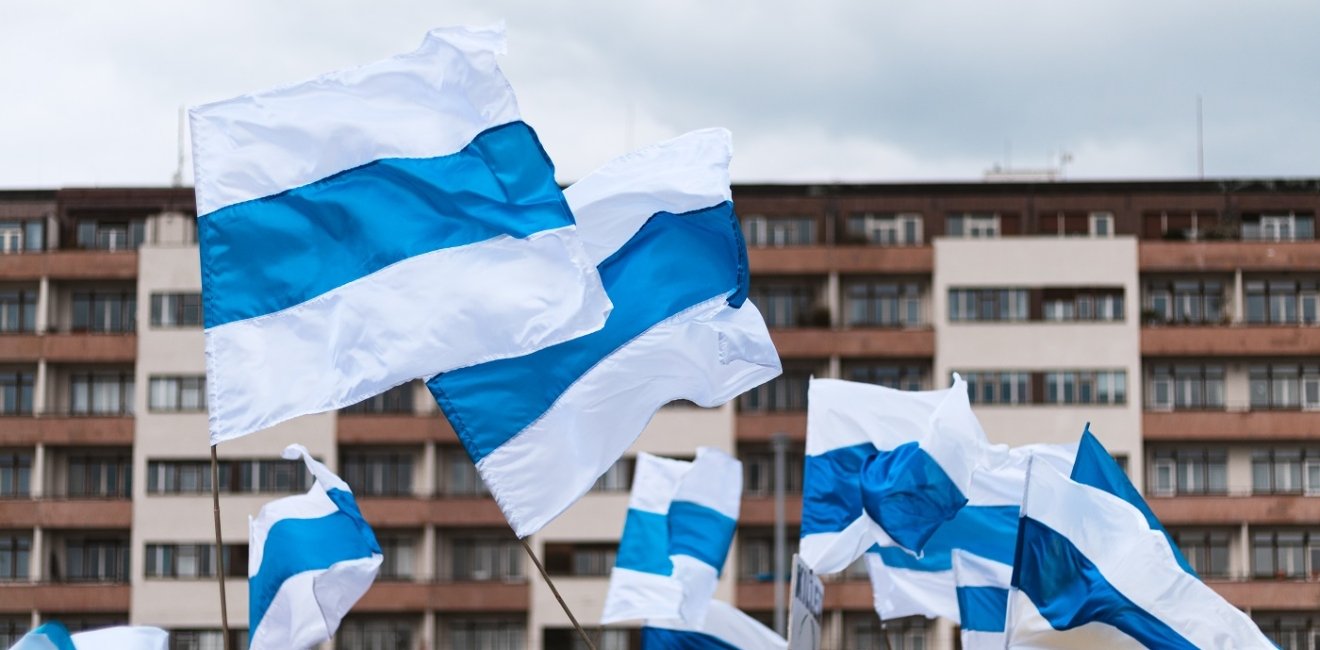
A blog of the Kennan Institute
Russia’s exiled opposition faces a critical challenge of legitimacy, struggling to connect with the Russian people at home and abroad, and with international audiences as well. While united in their anti-Putin stance, divisions over patriotism, national identity, and Western alignment have hindered their ability to build a cohesive movement. Should it fail to address the grassroots patriotism that resonates with many Russians and move beyond their “civilizing” rhetoric, the opposition will ultimately alienate the very society they claim to represent. Their future depends on bridging this gap and finding a way to genuinely act as representatives of the Russian people.
On a chilly November afternoon in Berlin, Yulia Navalnaya, Alexei Navalny’s widow, joined former political prisoners Ilya Yashin and Vladimir Kara-Murza to lead a march against “war, tyranny, and political murders.” With strong credentials to deliver a unifying message to Russia’s exiled opposition, the trio nonetheless faced doubts about the march. Its goals—Russia’s immediate withdrawal from Ukraine, Putin’s prosecution as a war criminal, and the liberation of all political prisoners—struck many as unrealistic. Among the critics was Luka Andreev, a 16-year-old whose family fled Russia to Estonia three years ago.
Andreev attended the Berlin march carrying the traditional Russian white-blue-red flag, a symbol now widely associated with resurgent Russian imperialism since Russia’s invasion of Ukraine. Fellow demonstrators, marching with the antiwar white-blue-white flag, quickly tore the tricolor from his hands. Shortly after, Andreev was accused of spreading Putinist propaganda in Estonia’s leading daily, Postimees.ee. His personal information was leaked, his family received threats, and Estonian authorities launched an investigation into his activities.
Anti-Putin or Anti-Patriotic?
Although dismissed by the march organizers as a minor issue, the flag incident is far from insignificant. At its core, Andreev’s stance calls for a political opposition dedicated to making Russia free. While firmly antiwar and anti-Putin, he rejects the cancellation of Russian culture, the transfer of Russia’s frozen assets to Ukraine, and attacks on Russian civilian infrastructure. His criticism of “anti-Russian excesses” has undoubtedly offended many within the exiled opposition. Yet much of what he advocates would likely resonate as common sense with many Russians, both at home and abroad. After all, it is hardly controversial to suggest that a successful opposition must resonate with and inspire patriotic Russians back home.
In her 2021 work Patriotism from Below, Karine Clément highlights the prevalence of “non-state patriotism” in urban Russia. The independent, Russia-based polling project Chronicles has shown that Russian society is not starkly divided between antiwar anti-Putin and pro-war pro-Putin camps. Public Sociology Lab’s reports from wartime Russia reveal a blend of distrust for state authorities with strong national identification and solidarity among citizens. These “critical patriots” were a key constituency Alexei Navalny targeted with his anti-corruption, “put Russia first” program, emphasizing social justice while avoiding giving offense to patriotic sentiments, such as WWII memory. Navalny understood the importance of grassroots patriotism—something today’s exiled anti-Putin oppositionists seem to overlook, along with the enduring importance of the tricolor flag for many Russians.
“Russia is us,” chanted participants of the Berlin march, to which Putin’s spokesman Dmitri Peskov retorted that the exiled opposition was “completely detached” from Russians at home. The sad truth is that Peskov is politically savvy enough to wrap the regime in patriotism. In the meantime, the anti-Putin opposition, struggling to define whether its primary audience is Russian society, Western political elites, or the transnational pro-Ukraine community, fails to appeal to grassroot patriotic sentiment inside Russia. While denouncing Putin as a dictator and war criminal is justified, adopting the West’s “no appeasement” discourse resonates poorly in Russia, where over half the population supports peace negotiations. Figures like Ilya Yashin, Vladimir Kara-Murza, and Garry Kasparov diverge on this issue, but the opposition’s broader silence on “cancel culture” and hesitance to reject calls for Russia’s dismemberment alienate potential supporters. Aligning with Zelensky’s slogan to “make Russia small again” or portraying Russians as brainwashed victims in need of reeducation only deepens this divide.
The Civilized Opposition and the Russian Narod
The exiled Russian opposition often frames itself as shepherds of the Russian people rather than their representatives, reflecting a civilizational discourse. Yulia Navalnaya envisions building the “wonderful Russia of the future” her husband dreamed of, while Ilya Yashin asserts that the march proves a “peaceful, free, and civilized Russia exists.” Vladimir Kara-Murza believes many Russians desire a “normal European civilized democratic” nation. In the meantime, figures like Ekaterina Margolis and Sergei Medvedev argue that imperialism and militarism pervade Russian society, including the opposition. Despite these differences, the exiled opposition remains united in seeking to return Russia to the “civilized world,” often equated with Europe and the broader West.
The term “civilization” appears frequently in anti-Putin rhetoric, often mirroring Putin’s usage but with an inverted meaning. Many among the opposition idealize the West as a superior civilization, lament Russia’s backwardness, and frame their struggle as a mission to civilize the country. This outlook not only undermines their democratic aspirations by echoing the imperialist attitudes they criticize but also alienates them from Russian society by portraying democracy as something foreign to Russia. Furthermore, as Europe faces its own democratic crises and rising populism, the opposition’s elitist stance—contrasting “good” and “civilized” Russians with so-called brainwashed “vatniks”—reinforces the polarizing binary they aim to dismantle, inadvertently reinforcing the Kremlin’s divisive rhetoric.
The Russian anti-Putin opposition is often criticized for failing to address the problematic legacy of Russian imperialism and the specific needs of the country’s ethnic minorities—criticism that is entirely warranted. Equally troubling, however, is the opposition’s inability to engage with issues of class and social inequality. It appears blind not only to the challenges faced by ethnic minorities but also to those of rural residents, small-town populations, the poor, the under-educated, single mothers, and the elderly. In short, the opposition seems disconnected from a society grappling with profound inequalities—ethnic, class, gender, and regional. This detachment makes it difficult for the opposition to represent a significant portion of Russian society, leaving it vulnerable to the accusation that it represents nobody but itself.
Towards a Patriotic Representative Democracy
Nobody would claim the situation for Russia’s exiled oppositionists is easy. They do not have a unified constituency and struggle to find funding or official status in the EU. They are pressured to show solidarity with Ukraine and oppose their own country. They lack a connection to any grassroot community, be it the Russians living abroad or Russians in Russia. Yet, they must not lose sight of what should be their primary aim: winning the support in Russian society. To do that, they must stop ignoring grassroot Russian patriotism and portraying themselves as civilizers of Russia. Instead, they must find a new way to act as representatives of the Russian people.
The concept of representation lies at the heart of democracy—it is the essence of representative governance. Failing to embrace it, as many in the Russian opposition tend to do, is not a constructive path forward. Born from the union of democracy and nationalism, the ideal of vlast’ naroda, a government of and by the people, remains a powerful one. To make this ideal resonate, the opposition must embrace it fully, so that one day the slogan of the Berlin march—“Russia is us!”—can once again ring true for millions of Russians.
The opinions expressed in this article are those solely of the authors and do not reflect the views of the Kennan Institute.
Authors



Kennan Institute
The Kennan Institute is the premier US center for advanced research on Eurasia and the oldest and largest regional program at the Woodrow Wilson International Center for Scholars. The Kennan Institute is committed to improving American understanding of Russia, Ukraine, Central Asia, the South Caucasus, and the surrounding region through research and exchange. Read more

Explore More in The Russia File
Browse The Russia File
Chechnya as a Model of Modern Russia

Russia’s Indigenous Communities and the War in Ukraine

Gas and Power in a Changing US–Russia Relationship

